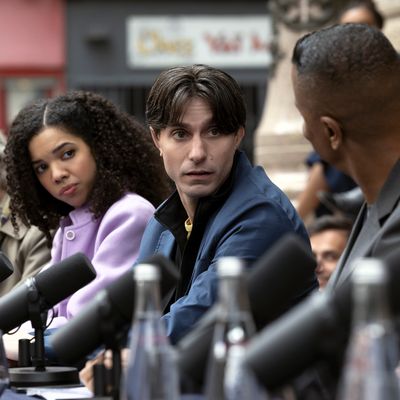Étoile Recap: Tobias Versus Cheyenne
April 24, 2025
‘Étoile’ Recap, Episodes 3 and 4: Tobias Versus Cheyenne
Things you buy through our links may earn Vox Media a commission.
12:00 P.M.

Photo: Philippe Antonello/Prime Video
The personal, professional, and political collide in these two chapters of Étoile, where Crispin Shamblee’s shenanigans at home and at sea create major problems for these characters and their organizations. When Crispin makes a vindictive bid to change MBT’s Fish Theater, named after Jack’s great-grandmother, to the Shamblee Theater, he sends Jack into an existential crisis that endswith him suing himself. Geneviève doesn’t get it any easier, stumbling into the fallout from an environmental catastrophe caused by a Shamblee Energy Solutions oil spill off the coast of Brittany. Inadvertently calling the spill a “hiccup” on live radio, Geneviève gains the ire of environmentalists across the globe, launching a wave of bad press just before the opening night performances of MBT and LBN’s shared season.
Charlotte Gainsbourg wasn’t originally cast as Geneviève; she took over the role when Camille Cottin backed out over scheduling conflicts. Gainsbourg isn’t a television actress; she’s a movie star, and she brings big-screen charisma and coolness to her character. There’s an impressive ease to her comedy, and these episodes highlight her physicality: the forceful hair flips when she’s frustrated during a conversation, the reflexive way she kicks off her high heels when she enters her office, and most jubilantly, sliding around on the floor of an opulent empty lobby.
That last bit says a lot about how Geneviève thinks about her job. She’s been an arts leader for years and has made it to the top, but because it’s an interim position, she knows that she should savor the power while she has it. She’s also not taking this as seriously as she should, which she learns the hard way with her “hiccup” comment. Her attempts to rationalize the word are incredibly funny, with Gainsbourg’s delivery vacillating between dedication to selling the lie and a humiliating understanding of just how stupid she sounds.
Geneviève is collateral damage for Crispin, but Jack is a direct target. Crispin holds a grudge against Jack’s family, and his meddling with the theater name reveals a lot about Jack’s upbringing. Family dynamics are at the center of episode three, “The Fish,” which introduces Jack and Geneviève’s relatives to provide important exposition and context for the behavior of the two leaders. There was no way this dance-centric series wasn’t going to find a role for the great Kelly Bishop — original Broadway cast member of A Chorus Line, mother of Dirty Dancing’s Baby, longtime Sherman-Palladino collaborator — and she plays Jack’s mother, Clara, an aristocrat who veers closer to Gilmore Girls’sEmily Gilmore than Bunheads’s free-spirited Fanny Flowers.
A woman whose poor circulation led to her arms and legs being amputated, Dorothy Fish’s only joy in her later life was watching people enter the theater that bore her name, and as a very small child, Jack would sit with her and watch. It’s not a memory he remembers, but it sheds light on why he’s so sensitive to Crispin changing the name. MBT is Jack’s birthright, and Crispin is erasing the legacy that makes Jack an inheritor. And he’s doing it out of spite. At a lunch taking place in Crispin’s “hall of mirrors” full of doppelgängers intended to confuse any potential assassins, Crispin patronizes Jack by recalling him as a little boy crying in striped overalls, and plainly tells him that everything he is doing is retaliation for something Jack’s father did to Crispin in the past. The Fish family ultimately decides to retaliate back, leading to the aforementioned self-suing.
Geneviève finds herself in various family dynamics in these episodes, starting with a visit to her sister, Leonor (Céline Menville), an overachieving mother of three who doesn’t want Geneviève to give her children unattainable goals. Geneviève’s niece wants a job like her cool aunt, but there is only one job like hers, and she will have to die for it to open up. Geneviève comes from a more humble background than Jack, and she’s likely had to put in far more work and make more sacrifices to get to a position that isn’t even concretely hers yet.
Geneviève storms out of her sister’s house, only to end up in another tense family situation when she arrives late to Mishi’s homecoming party and leaves early after dragging down the vibes at the dinner table. Mishi has been quiet, cute, and naive thus far, but she grows up when she confronts Geneviève during dinner, blaming her for the current situation because she cut Mishi and dragged her back, leaving her mojo behind in New York City. Taïs Vinolo’s performance captures both the fire of Mishi’s anger and her lingering fear of speaking up to authority, so there’s an even greater sense of victory when she’s able to communicate how she truly feels.
The Mishi story spotlights the storytelling in Donna Zakowska’s costumes. In episode two, Mishi looked like a child coming back from vacation in New York City, carrying a bagel plushie while wearing all-NYC apparel. When she returns home from work in episode three, she’s in a plaid miniskirt and Mary Janes, which evokes a day spent at school. Her costuming changes dramatically for dinner, and she looks like a glamorous young woman in her sparkly, lacy, all-white ensemble, a strong contrast to Geneviève’s black blazer and slacks. There’s still a girlish quality to Mishi’s look thanks to the short shorts, which also accentuate the legs that will determine her greatness.
Mishi’s passion shows Geneviève her potential, which can’t be reached while she lives in the ancestral home where Ben Franklin screwed a countess against a tree. In an unexpected turn of events, Geneviève turns to the woman who nurtured her greatest star, asking Cheyenne’s mother, Bruna (Marie Berto), to take in Mishi as a new roommate. Bruna welcomes Mishi like a drill sergeant, throwing down a dusty mattress and telling her that she’ll get a real bed if she can make it through a night on the floor.
Tough love is hereditary for the Toussaints, and while Mishi gives up the extravagances of her home to stay with Bruna, SuSu discovers the pressure of being mentored by Cheyenne. When Jack discovers SuSu’s late-night rehearsing — sending her mother into a total panic — Cheyenne makes him enroll SuSu in the school by appealing to his passion for the art form. After crashing SuSu’s first class and bombarding her with demands that mortify the teacher, Cheyenne takes on full responsibility for SuSu’s training, which is equally dedicated to building up her artistic conviction and physical prowess.
SuSu doesn’t have as much screen time as the other leads, but LaMay Zhang’s subdued yet direct performance makes her a vital member of the cast, representing a child dancer’s perspective in a way that isn’t condescending. There’s a lot that SuSu doesn’t know, and her first impression of formal ballet culture is being shaped by Cheyenne, an anti-authority taskmaster with astronomically high standards for technique. To SuSu’s credit, she stands up for herself when Cheyenne’s presence makes the other kids treat her differently, but this just leads to another lesson. SuSu shouldn’t care about “the mediocrities,” and when she suggests they might be her friends, Cheyenne points out all of the flaws SuSu hasn’t noticed.
She hasn’t noticed because she wasn’t looking, and SuSu doesn’t know what makes something “good” or “bad” yet. Those words are often subjective, but ballet is a technique-focused art form built on precision, uniformity, and repetition. Dancers are constantly made aware of their weak spots, and those faults are put on display before the entire company, creating extra social pressure to fix whatever isn’t working.
Cheyenne notices the weaknesses right away, which is a way for her to maintain a feeling of superiority that she needs to fuel her ambition. She can’t be the best unless she can define how others are worse, but that’s not a healthy mindset to give a child who is excited about the social aspect of joining a ballet school. SuSu walks away from the interaction confused, while Cheyenne realizes that she isn’t a friend but a coach, demanding that SuSu address her as “Miss Toussaint” from now on.
Cheyenne’s personal relationships demand artistic excellence, and when she feels that connection, as she does with SuSu and Gael, those relationships develop fast. Cheyenne and Gael quickly go from dancing together to having sex on Jack’s couch, and this entire storyline is one gigantic HR violation that takes the series out of reality and puts it on a more ridiculous comedic plane.
Cheyenne gets Jack to let go of his resentment toward Gael by delivering a plea to his penis, once again making me wonder just what happened between them during Cheyenne’s first stint at MBT. There’s definitely a sense that Jack is as jealous about Gael’s intimacy with Cheyenne as he is angry about Gael leaving MBT in a lurch in the past, but this series enters complicated ethical territory once it introduces a romantic relationship between the executive director and his star dancer, who is still a subordinate even if she’s a total dom in every other way.
The Sherman-Palladinos are committed to using this series to advocate for live dance performance, showcasing the work that goes into its creation and the splendor of the final product.“The Fish” opens with a montage of dancers getting ready for the day, taping their feet, shaving their armpits, and pinning their hair. One of the dancers puts in a mouthguard, imagery that presents dance as a sport as much as an art, a theme that also pops up in the Cheyenne/SuSu storyline.
Episode four, “The Hiccup,” is where dance performance comes to the forefront of Étoile. A montage cuts between Cheyenne and Gael rehearsing Christopher Wheeldon’s “Bound To” while Tobias and Gabin (Ivan du Pontavice), the “bad boy” of MBT, put together a new piece, using choreography to enrich these relationships by bringing tenderness to Cheyenne and Gael and ferocity to Tobias and Gabin. Unfortunately, Gabin is a huge dud of a character that struggles to justify his presence in the narrative. He’s not part of the trade and not an Étoile at LBN, and being an athletic dancer doesn’t make it any easier to root for him when his main role is to be an entitled, irritating asshole.
I’m very happy that episode four dedicates a significant portion of its runtime to showing the actual performances in LBN and MBT’s programs, which include pre-existing works and original material created for the show by Marguerite Derricks. Each piece is prefaced by onscreen credits with the title, conductor, music, and dancers, providing another taste of the theater experience for viewers at home. A mass TV audience is being exposed to contemporary ballet pieces like “Bound To” and more classical works like Marius Petipa’s “La Bayadère” and “Black Swan,” and the variety emphasizes how these dancers have to adapt their bodies for different types of movement and expression.
Tobias is extremely particular about the bodies that he uses in his choreography, and he has a total meltdown when he sees Cheyenne dance a part that he never cast her in. Tobias versus Cheyenne is a very entertaining clash of two stubborn personalities, but that stubbornness comes from their commitment to the art. The antagonism dies when they realize they can change the choreography to take advantage of Cheyenne’s strengths, even though keeping the dancers after their performance to re-choreograph has to be a violation of union rules.
The Tobias-Cheyenne fight is an excellent misdirect. As the oil-spill story develops, tension builds around how this show’s principal eco-warrior is going to react. The Tobias drama completely diverts attention away from Crispin, making Cheyenne’s onstage admonishment of him a more surprising and satisfying twist. In a speech dripping with cynicism, Cheyenne mourns for the dying arts and the dystopian future that awaits future generations, placing the blame on everyone in the room, but specifically the man whose name has been newly added to the theater. It’s an attack on the funding both of these companies need, but it’s also a sure-to-be-viral moment that will appeal to younger audiences, which is exactly what this campaign is supposed to do.
ÉtoileRecap: Tobias Versus Cheyenne
Things you buy through our links may earn Vox Media a commission.
You’ll receive the next newsletter in your inbox.
*Sorry, there was a problem signing you up.
Search
RECENT PRESS RELEASES
Related Post




